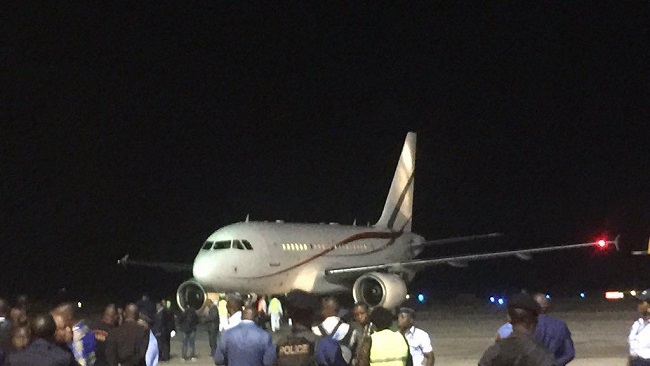Former Congolese opposition leader’s body arrives in Kinshasa
The body of longtime Congolese opposition leader Etienne Tshisekedi arrived in Kinshasa from Belgium on Thursday, ending a two-year political standoff that eased when his son became president earlier this year.
The plane transporting the body of the late Congolese politician arrived in the capital, Kinshasa, shortly after 7.20pm local time, according to Congolese state TV, RTNC.
The repatriation of the opposition leader, who died in Belgium aged 84, ended a two-year political standoff after his son, Felix, won the presidential election in January.
Tshisekedi was considered so potent a threat to former president Joseph Kabila that his corpse was not allowed to enter the country of his birth.
A funeral is scheduled for Friday at the 80,000-seat Martyrs Stadium in the capital, Kinshasa. Six heads of state are expected to attend, from the Republic of Congo, Angola, Zambia, Togo, Guinea and Rwanda. Burial is set for Saturday at a family plot on the city’s outskirts.
‘Even in death Tshisekedi makes Kabila afraid’
Etienne Tshisekedi, known for his fiery criticism of Kabila and his trademark flat cap, died in February 2017 of a pulmonary embolism at a Brussels hospital, not living long enough to see his political nemesis Kabila leave power. At the time, tensions were at an all-time high over Kabila’s political future as critics feared he would not cede power in the mineral-rich nation.
Family members and Tshisekedi’s UDPS party were unable to reach an agreement with Kabila’s government for the repatriation of his body, as the regime feared a funeral could lead to a resurgence of opposition demonstrations calling for Kabila’s ouster.
“Even in death Tshisekedi makes Kabila afraid,” Jean-Marc Kabund said in 2017 when he was the UDPS party’s secretary-general.
Tshisekedi was one of the party’s founders in 1982 as opposition grew to then-dictator Mobutu Sese Seko, who ruled Congo for decades. Two years after the country allowed multiple political parties in 1990, Tshisekedi became prime minister in an uneasy on-again, off-again partnership with Mobutu.
Tshisekedi’s international prominence grew in 2011 when he ran against Kabila for president. He later declared himself president after an election marred by allegations of vote-rigging by the ruling party. He was then placed under de facto house arrest.
Tshisekedi kept up his criticism until the end, at one point accusing Kabila of treason for not stepping down at the end of his mandate in late 2016. A court ruled that Kabila could stay on until the next election was held, but Tshisekedi called it a “coup d’état that was carried out with the blessing of the constitutional court.”
Kabila’s government, under international pressure, eventually cleared the way for an election and Felix Tshisekedi was declared the winner, although another opposition candidate, Martin Fayulu, maintains he was the victor. Critics suggested that Tshisekedi had reached a backroom deal with Kabila as the most palatable candidate after Kabila’s chosen candidate fared poorly.
Those fears were exacerbated when Kabila’s party won a majority in legislative elections, earning the right to choose Congo’s prime minister. Concerns remain that Kabila aims to run for the presidency again in the next election.
(FRANCE 24 with AP)





